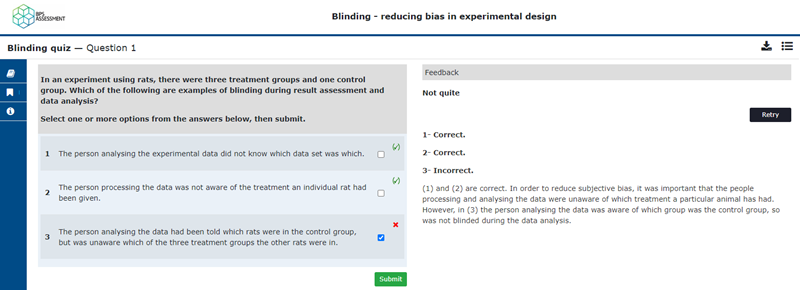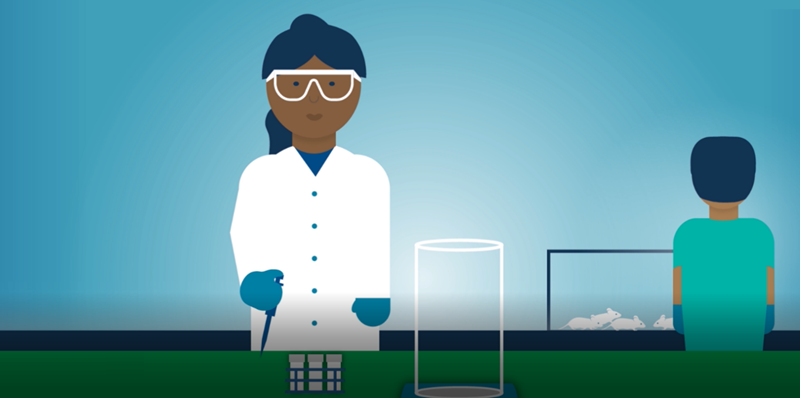Published: 15 Sep 2020
Category:
The British Pharmacological Society recently developed a new
elearning resource on Blinding in Experimental Design. In this blog, we take a look at the background, reach and impact of this new educational tool.
Why have we developed this resource?
The British Pharmacological Society recognises the importance of animal research. Advancements in biomedical research and the development of safe and effective medicines are made possible due to in vivo studies.
In vivo education and training has been a key priority for the Society for many years. In 2004, the Society managed an
Integrative Pharmacology Fund (IPF), supported by contributions from AstraZeneca, GlaxoSmithKline and Pfizer. This was in response to an ABPI skills survey which identified in vivo pharmacology as an industry skills shortage. The aim of the funded activities was to ensure an academic pipeline for in vivo education, training and research to support future generations of in vivo scientists.
In 2017, we developed the
curriculum for the use of research animals, relevant to undergraduates and taught masters on any bioscience degree programmes. The curriculum is broken down into core and experiential learning outcomes covering knowledge, skills, and attitudes. The core learning outcomes are relevant to any student who analyses literature and/or data generated from studies involving research animals and can be taught in a classroom setting without necessitating the use of laboratory animals.
It is our objective to sustain a skilled workforce that supports the development of novel therapeutics, which we do by delivering high quality training and education activities. Educating future generations of scientists on good experimental design should enable improvements to study design and analysis/interpretation of results from animal studies, thereby improving the reproducibility and translatability of such research into the clinical setting.
Recognising the limited space available in HEI timetables, and the increased workload of both educators and students, we plan to create eLearning modules to support bioscience educators in teaching aspects of the curriculum. The aim is to develop blended learning tools that will complement teaching without excessively increasing student/educator time burden.
The culmination of this work and plans has led to the creation of our first free eLearning resource, covering the topic of blinding as part of a wider experimental design module.
What does this resource include and who is the target audience?
This resource is hosted on the
BPS Assessment platform, and is free to use, though you need to register for access.
The resource is aimed at undergraduates on any bioscience degree programme. It can be accessed by students as self-directed learning, or by educators as a teaching tool. Users are provided with feedback on assessment answers to support and build on their understanding.
The resource consists of:
- an animation explaining the importance of blinding in animal research
- multiple-choice questions on the topic of blinding
- an advanced literature review task
These components can be used together or individually to tailor the learning experience to the user’s needs, making this a flexible and adaptable educational tool.

How was this resource developed?
Dr Jude Hall, a British Pharmacological Society Fellow, acting as an independent consultant, worked with the Society and Society members to develop the scientific content, storyboards, assessment material, and peer review for this resource. Jude is a subject expert and university educator who specialises in developing eLearning resources for learned societies and academic institutions.
Jude previously led the development of the
Marmoset in Parkinson’s Research video, also available as a free educational resource, which was developed with colleagues at King’s College London and co-funded by the
National Centre for the Replacement, Refinement and Reduction of Animals in Research (NC3Rs) and the Society.
Dr Manasi Nandi (Reader in the Faculty of Life Sciences & Medicine, King’s College London) was the peer reviewer for the animation and supported development of the advanced literature review task.
The storyboard and animation design was reviewed by science communicator contacts and the animation was created by
Senate Media.
A wider peer and user review group regularly reviewed content to ensure validity and evaluate the suitability of the content to the intended audience. This group included educators and scientists with varying expertise and knowledge in in vivo experimental science, to ensure as many opinions as possible were represented in the outcome of the resource.
Peer review group:
Prof Clare Stanford (UCL)
Dr Elliot Lilley (RSPCA)
Dr Nathalie Percie du Sert (NC3Rs)
Dr Manasi Nandi (KCL)
Dr Lawrence Moon (KCL)
Dr Ian Morton (retired)
Dr Liam Bagley (MMU)
Dr Leanne Stokes (UEA)
Academic relevance
This resource is intended to support teaching and learning of experimental design. It will be useful for all educators to supplement their teaching with student-facing and self-directed learning. It will also be useful for educators who have less experience teaching this topic.
Although the resource was developed primarily to be formative, it is also scored, and therefore can be used as a knowledge check for students either before or after covering experimental design within a biosciences degree programme.
We are really proud that many of the educators we have reached so far have shared positive feedback and plan to integrate this into their degree programmes, specifically for first and second year undergraduates, from September 2020.
Dr Alison Cooper (Birmingham): “Relevant and can be used to support experimental design discussions.”
Dr Christine Edmead (Bath): “I think this is an excellent resource. It addresses a fairly basic but important concept in a very approachable and engaging manner but encourages students to think more widely about the topic.”
Dr Stephen Kelley (Dundee): “This is an informative resource that would be suitable for our level 4 students.”
Dr Steven Tucker (Aberdeen), VP Academic Development for the British Pharmacological Society: “I intend to use this excellent and highly flexible resource in a variety of ways for different groups of students across UG levels. Its design represents an excellent collaborative effort to provide a highly relevant resource for use across the biosciences.”
We are also pleased with feedback from our student user tester. As the key audience for this resource, we are delighted that it furthered their understanding of this topic area.
Sophie Inthinathan (2nd year pharmacology student at QMUL):
I would say that the resource was very helpful in further understanding the topic of blinding in experimental design and it provided great detailed answers. The use of images was great for visual learning and I was able to apply it to what has been taught in lectures. This is a great resource which can be used for exam revision. Overall, I was satisfied with the new resource.
Summary
The resource covers one of the ‘Essential 10’ topics of the
ARRIVE guidelines and is freely available to everyone everywhere. We therefore hope this resource will be widely used. Beyond education, this might also serve as a refresher to researchers.
The Society is exploring an “Experimental Design” module, adding to this pilot Blinding resource. We hope to produce further eLearning resources on topics such as randomising, power calculations, sample sizes and managing variability. The Society will continue to support education and training for those undertaking the essential use of animals in scientific research.
Professor Clive Page, President-Elect for the British Pharmacological Society and Professor of Pharmacology and Director of the Sackler Institute of Pulmonary Pharmacology at King’s College London: “This resource looks great and we need to make sure it gets used. Beyond undergraduates, this free and engaging resource is useful to PhD students, postdocs, and researchers. I think that when anyone is following the ARRIVE guidelines, or plans to publish their experimental results, they should be made aware of this resource and, if needed, complete it to reinforce their knowledge.”
We would like to thank all the educator and researcher experts who were part of this development. We also would like to thank the NC3Rs for their endorsement of the resource and support in developing it.
If you have any feedback after using the resource, or would like to be involved in future projects, please get in touch with us at
education@bps.ac.uk

Comments
If you are a British Pharmacological Society member, please
sign in to post comments.